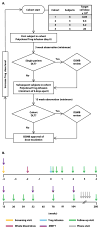Type 1 diabetes immunotherapy using polyclonal regulatory T cells
- PMID: 26606968
- PMCID: PMC4729454
- DOI: 10.1126/scitranslmed.aad4134
Type 1 diabetes immunotherapy using polyclonal regulatory T cells
Abstract
Type 1 diabetes (T1D) is an autoimmune disease that occurs in genetically susceptible individuals. Regulatory T cells (Tregs) have been shown to be defective in the autoimmune disease setting. Thus, efforts to repair or replace Tregs in T1D may reverse autoimmunity and protect the remaining insulin-producing β cells. On the basis of this premise, a robust technique has been developed to isolate and expand Tregs from patients with T1D. The expanded Tregs retained their T cell receptor diversity and demonstrated enhanced functional activity. We report on a phase 1 trial to assess safety of Treg adoptive immunotherapy in T1D. Fourteen adult subjects with T1D, in four dosing cohorts, received ex vivo-expanded autologous CD4(+)CD127(lo/-)CD25(+) polyclonal Tregs (0.05 × 10(8) to 26 × 10(8) cells). A subset of the adoptively transferred Tregs was long-lived, with up to 25% of the peak level remaining in the circulation at 1 year after transfer. Immune studies showed transient increases in Tregs in recipients and retained a broad Treg FOXP3(+)CD4(+)CD25(hi)CD127(lo) phenotype long-term. There were no infusion reactions or cell therapy-related high-grade adverse events. C-peptide levels persisted out to 2+ years after transfer in several individuals. These results support the development of a phase 2 trial to test efficacy of the Treg therapy.
Copyright © 2015, American Association for the Advancement of Science.
Conflict of interest statement
Figures







Comment in
-
Regulatory T Cell Immunotherapy for Type 1 Diabetes: A Step Closer to Success?Cell Metab. 2016 Feb 9;23(2):231-3. doi: 10.1016/j.cmet.2016.01.010. Cell Metab. 2016. PMID: 26863486
References
-
- McKnight JA, Wild SH, Lamb MJE, Cooper MN, Jones TW, Davis EA, Hofer S, Fritsch M, Schober E, Svensson J, Almdal T, Young R, Warner JT, Delemer B, Souchon PF, Holl RW, Karges W, Kieninger DM, Tigas S, Bargiota A, Sampanis C, Cherubini V, Gesuita R, Strele I, Pildava S, Coppell KJ, Magee G, Cooper JG, Dinneen SF, Eeg-Olofsson K, Svensson AM, Gudbjornsdottir S, Veeze H, Aanstoot HJ, Khalangot M, Tamborlane WV, Miller KM. Glycaemic control of Type 1 diabetes in clinical practice early in the 21st century: An inter- national comparison. Diabet Med. 2015;32:1036–1050. - PubMed
-
- Miller KM, Foster NC, Beck RW, Bergenstal RM, DuBose SN, DiMeglio LA, Maahs DM, Tamborlane WV. T1D Exchange Clinic Network, Current state of type 1 diabetes treatment in the U.S.: Updated data from the T1D exchange clinic registry. Diabetes Care. 2015;38:971–978. - PubMed
-
- Herold KC, Gitelman SE, Ehlers MR, Gottlieb PA, Greenbaum CJ, Hagopian W, Boyle KD, Keyes-Elstein L, Aggarwal S, Phippard D, Sayre PH, McNamara J, Bluestone JA AbATE Study Team. Teplizumab (anti-CD3 mAb) treatment preserves C-peptide responses in patients with new-onset type 1 diabetes in a randomized controlled trial: Metabolic and immunologic features at baseline identify a subgroup of responders. Diabetes. 2013;62:3766–3774. - PMC - PubMed
-
- Rigby MR, DiMeglio LA, Rendell MS, Felner EI, Dostou JM, Gitelman SE, Patel CM, Griffin KJ, Tsalikian E, Gottlieb PA, Greenbaum CJ, Sherry NA, Moore WV, Monzavi R, Willi SM, Raskin P, Moran A, Russell WE, Pinckney A, Keyes-Elstein L, Howell M, Aggarwal S, Lim N, Phippard D, Nepom GT, McNamara J, Ehlers MR T1DAL Study Team. Targeting of memory T cells with alefacept in new-onset type 1 diabetes (T1DAL study): 12 Month results of a randomised, double-blind, placebo-controlled phase 2 trial. Lancet Diabetes Endocrinol. 2013;1:284–294. - PMC - PubMed
Publication types
MeSH terms
Grants and funding
LinkOut - more resources
Full Text Sources
Other Literature Sources
Medical
Research Materials

